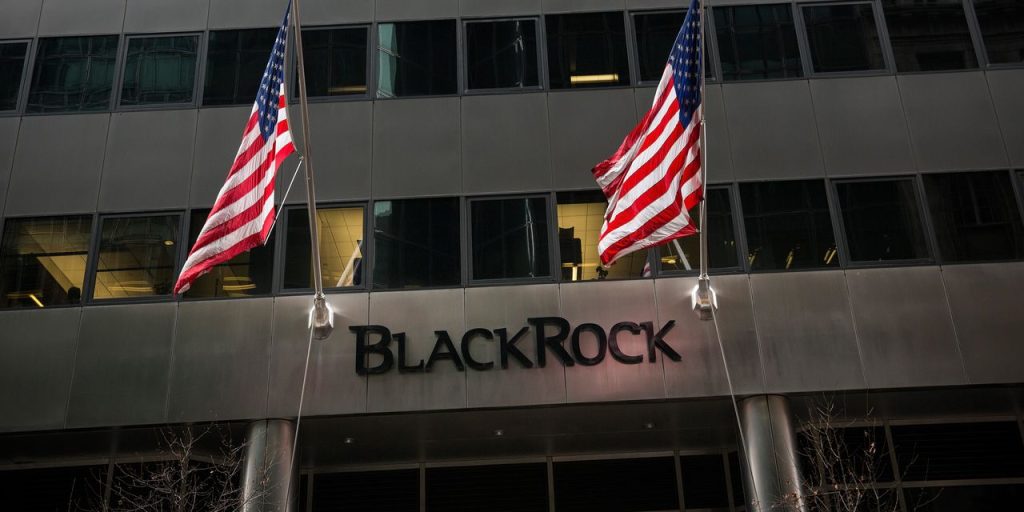BlackRock
reported first-quarter adjusted earnings Friday morning that beat expectations and net inflows that surprised on the upside, pushing the stock higher.
Adjusted earnings were $7.93 a share in the first quarter, down 17% from a year ago but still beating estimates of $7.78. Total revenue was $4.2 billion, down 10% from a year ago.
BlackRock
shares (ticker: BLK) were up 3.2%, at $692.03, in recent trading. The
S&P 500
was down 0.3%.
Total assets under management (AUM) at the New York-based asset manager stood at $9.1 trillion, up modestly from the fourth quarter but still down 5% from a year ago.
“I’m more excited than ever about the potential and the promise that we have lying ahead,” an upbeat CEO Larry Fink said on the earnings call.
Analysts closely watch the firm’s long-term net inflows, which include stock and bond products, private assets, and alternative investments, but not cash-management money-market funds. BlackRock reported net inflows of $103 billion, higher than analysts’ expectations of $77.2 billion.
“Asset gathering was strong this quarter,” said Kyle Sanders, senior equity analyst at Edward Jones, in a note. “BlackRock’s ability to sustain net asset inflows remains a key differentiator from its peers.”
Quarterly total net flows stood at $110 billion.
“The big takeaway here is the fund flow number. That is the delineating metric in the asset-management business because it reflects who is growing their AUM base,” Cathy Seifert, vice president at CFRA Research, told Barron’s. “In a really challenging quarter, what we saw was the durability of the BlackRock brand and capabilities.”
A large portion of inflows came from bond products, with the asset manager gathering $54 billion across bond funds and exchange-traded funds. Its iShares fixed-income ETFs captured the majority of the industry’s bond inflows, with nearly $34 billion this quarter, said Sanders.
“We believe the strength in fixed income is just the beginning of a multiyear trend of money flowing back into bond products,” Fink said. “Given the rise in interest rates, fixed-income products are now offering investors the most attractive yields in over a decade.”
BlackRock’s first-quarter earnings come a month after federal regulators announced they would take control of Silicon Valley Bank, the second-biggest bank failure in U.S. history after Washington Mutual’s collapse during the 2008-09 financial crisis. Worries of bank runs spread to other banks, prompting a regional banking crisis and spreading panic in financial markets.
Fink said investors turned to BlackRock for “insights and thought leadership on the economy on markets on geopolitics on asset allocation,” and that “within the first week following the SVB collapse we reached thousands of clients, providing them with real-time information and our views on the unfolding events.”
In October, BlackRock announced Gary Shedlin would step down as chief financial officer after the asset manager completed its reporting processes for fiscal year 2022. Friday’s earnings report was the first with Martin Small in the CFO role.
One issue that is top of mind for BlackRock watchers is environmental, social, and governance investing, known as ESG, which has become an increasingly politically fraught topic. Fink’s outspoken support for tackling climate change has made the asset manager a target of conservatives.
Fink’s recent letter to investors shied away from ESG investing compared with his most recent annual letters. In fact, ESG didn’t appear anywhere in the letter. Rather, Fink said that “it is for governments to make policy and enact legislation, and not for companies, including asset managers, to be the environmental police.”
While Fink didn’t mention ESG explicitly in the lengthy missive, he reiterated that “for years now, we have viewed climate risk as an investment risk” and “changes in globalization, supply chains, geopolitics, inflation, monetary and fiscal policy, and climate all can impact a company’s ability to deliver durable value. ”
He didn’t mention the topic in Friday’s earnings call.
Corrections & Amplifications
Martin Small is BlackRock’s chief financial officer. An earlier version of this article incorrectly identified him as Martin Snow.
Write to Lauren Foster at lauren.foster@barrons.com and Brian Swint at brian.swint@barrons.com
Read the full article here




